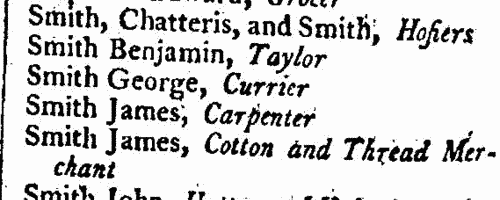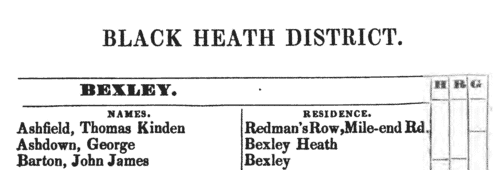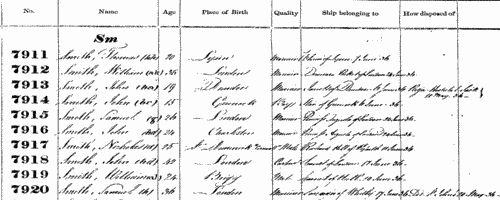Locket Surname Ancestry ResultsOur indexes 1000-1999 include entries for the spelling 'locket'. In the period you have requested, we have the following 57 records (displaying 21 to 30): Single Surname Subscription | | | Buying all 57 results of this search individually would cost £314.00. But you can have free access to all 57 records for a year, to view, to save and print, for £100. Save £214.00. More... |
These sample scans are from the original record. You will get scans of the full pages or articles where the surname you searched for has been found. Your web browser may prevent the sample windows from opening; in this case please change your browser settings to allow pop-up windows from this site. Inhabitants of St Columb in Cornwall
(1790-1797)
The provincial sections of the Universal British Directory include lists of gentry and traders from each town and the surrounding countryside, with names of local surgeons, lawyers, postmasters, carriers, &c. (the sample scan here is from the section for Nottingham). The directory started publication in 1791, but was not completed for some years, and the provincial lists, sent in by local agents, can date back as early as 1790 and as late as 1797.
LOCKET. Cost: £6.00.  | Sample scan, click to enlarge

|  Apprentices and clerks
(1802) Apprentices and clerks
(1802)
Apprenticeship indentures and clerks' articles were subject to a 6d or 12d per pound stamp duty: the registers of the payments usually give the master's trade, address, and occupation, and the apprentice's name, as well as details of the date and length of the apprenticeship. 3 June to 31 December 1802. IR 1/39LOCKET. Cost: £8.00.  | Sample scan, click to enlarge

| Tradesmen of Chester
(1392-1805)
Lists of admissions of freemen of the city of Chester from the earliest surviving records to 1805 were compiled by J. H. E. Bennett and published by the Lancashire and Cheshire Record Society from 1906. These lists were extracted from the mayoral yearbooks (dating back to 1392) and twelve freemen's rolls covering 1538 to 1612 and 1636 to 1805; and a list of admissions for 1505-1506 in Harleian MS 2105 (British Library). The record does not become more or less continuous until about 1490: in all, 12,426 freedoms are recorded. Freedom of the city, necessary to practise a trade in the city, could be obtained by birth (in which case the father's name and occupation are usually given); by apprenticeship to a freeman (the master's name and occupation being given); or by order of assembly. Both the freemen and the masters listed are indexed here. The main abbreviations used are: B, freedom taken up by right of birth; I, freedom taken up by right of indenture; M. B., Mayor's Book; *, freedom granted by order of assembly.LOCKET. Cost: £4.00.  | Sample scan, click to enlarge

| Workers at Ewart's Cotton Mill, Manchester
(1818)
The minutes of evidence taken before the Lords Committee on the Cotton Factories Bill include a series of reports by medical men as to the general health of the mill workers in April 1818. For each factory there is a complete list of workers, giving full name, age, how long employed in a factory, health (in general terms, such as 'Good' or 'Sickly'), and any chronic disease or 'distortion', cause and duration - with slight variations from report to report. The physicians examined several hundred people each day, asking such questions as 'Have you any swellings or sores anywhere?', 'Are your limbs straight?', 'Have you a good appetite for food?', 'Do you conceive yourself to be in good health?', and all concluded that the health of the mill workers was good, and that the workers were cheerful. This is the report for Peter Ewart's cotton spinning factory in Manchester, 21 April 1818.LOCKET. Cost: £6.00.  | Sample scan, click to enlarge

| Workers at Mitchell, Hardie & Scott's Cotton Mill, Manchester
(1818)
The minutes of evidence taken before the Lords Committee on the Cotton Factories Bill include a series of reports by medical men as to the general health of the mill workers in April 1818. For each factory there is a complete list of workers, giving full name, age, how long employed in a factory, health (in general terms, such as 'Good' or 'Sickly'), and any chronic disease or 'distortion', cause and duration - with slight variations from report to report. The physicians examined several hundred people each day, asking such questions as 'Have you any swellings or sores anywhere?', 'Are your limbs straight?', 'Have you a good appetite for food?', 'Do you conceive yourself to be in good health?', and all concluded that the health of the mill workers was good, and that the workers were cheerful. This is the report for Mitchell, Hardie and Scott's cotton spinning factory in Manchester, 17 April 1818.LOCKET. Cost: £6.00.  | Sample scan, click to enlarge

| Electors in Northfleet
(1835)
A poll to elect knights of the shire to represent the Western Division of the county of Kent in parliament was held in 1835, the candidates being Thomas Law Hodges (H), Thomas Rider (R) and sir William R. P. Geary (G). The poll started on January 19th; Rider withdrawing his name on that first day, the poll was closed prematurely, many electors not yet having voted. This poll book lists all the electors, whether they voted or not; the county franchise included not only male freeholders of 40s a year, but also £10 copyholders and long-leaseholders, and £50 short-leaseholders and tenants. For each elector the full name is given (surname first) and residence (often not the place for which qualified to vote). Votes are indicated by dashes in the right-hand columns. LOCKET. Cost: £4.00.  | Sample scan, click to enlarge

| Poachers committed to prison in Shropshire
(1833-1836)
In response to a parliamentary enquiry, returns were made in early 1836 from each of the gaols in England and Wales of the number of commitments, prosecutions, convictions and sentences under the game laws since 1 November 1833. The returns varied in scope; most give the full name of each poacher, date, and sentence. The usual offence is that of 'poaching', i. e. being out armed in the night in pursuit of game; occasionally it was aggravated by assaulting a gamekeeper &c.LOCKET. Cost: £6.00.  | Sample scan, click to enlarge

|  British merchant seamen
(1835-1836) British merchant seamen
(1835-1836)
At this period, the foreign trade of ships plying to and from the British isles involved about 150,000 men on 15,000 ships; and the coasting trade about a quarter as many more. A large proportion of the seamen on these ships were British subjects, and so liable to be pressed for service in the Royal Navy; but there was no general register by which to identify them, so in 1835 parliament passed a Merchant Seamen's Registration Bill. Under this act this large register of British seamen was compiled, based on ships' crew lists gathered in British and Irish ports, and passed up to the registry in London. Each seaman was assigned a number, and the names were arranged in the register by first two letters of the surname (our sample scan shows one of the pages for 'Sm'); in addition, an attempt was made to separate out namesakes by giving the first instance of a name (a), the second (b), and so on. But no effective method was devised to prevent the same man being registered twice as he appeared in a second crew list; moreover, the original crew lists were clearly difficult for the registry clerks to copy, and some of the surname spellings appear to be corrupted. A parliamentary committee decided that the system devised did not answer the original problem, and this register was abandoned after less than two years: but it is an apparently comprehensive source for British merchant seamen in 1835 to 1836. The register records the number assigned to each man; his name; age; birthplace; quality (master, captain, mate, 2nd mate, mariner, seaman, fisherman, cook, carpenter, boy &c.); and the name and home port of his ship, with the date of the crew list (usually at the end of a voyage). Most of the men recorded were born in the British Isles, but not all (for instance, Charleston and Stockholm appear in the sample scan). The final column 'How disposed of' is rarely used, and indicates those instances where a man died, was discharged, or deserted his ship during the voyage.LOCKET. Cost: £8.00.  | Sample scan, click to enlarge

| Staffordshire Inquests
(1837)
The accounts of expenses incurred by Henry Smith of Wolverhampton, Staffordshire coroner, list the full names of the deceased, the date and place of each inquest. January to December 1837LOCKET. Cost: £6.00.  | Sample scan, click to enlarge

| Insolvents
(1840)
Insolvency notices for England and Wales: insolvency often caused people to restart their lives elsewhere, so these are an important source for lost linksLOCKET. Cost: £6.00.  | Sample scan, click to enlarge

|
Research your ancestry, family history, genealogy and one-name study by direct access to original records and archives indexed by surname.
|













